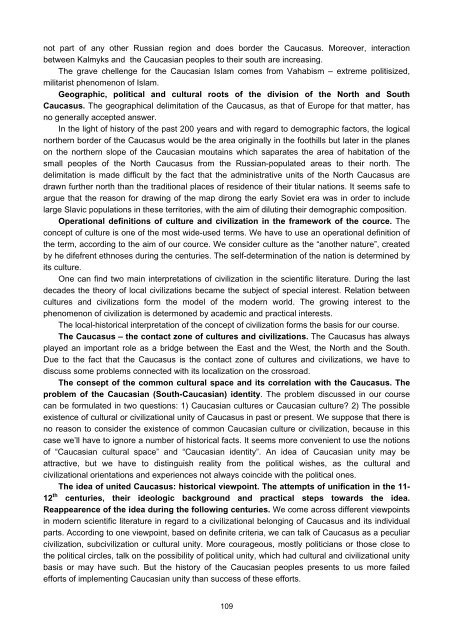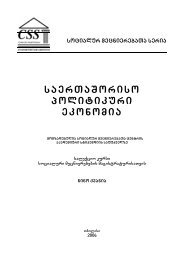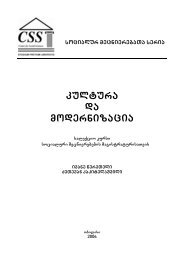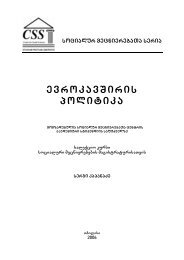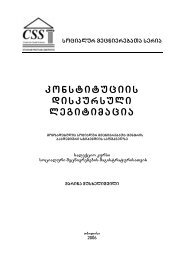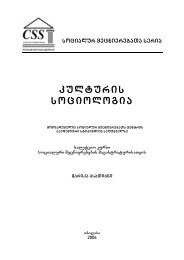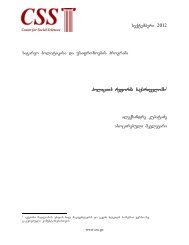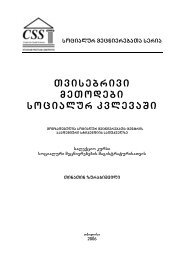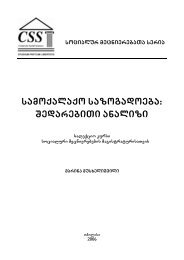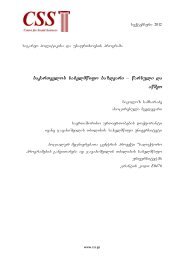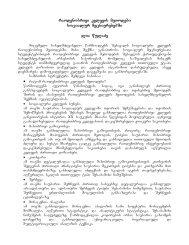kavkasiis geografiuli garemo da mosaxleoba - Center for Social ...
kavkasiis geografiuli garemo da mosaxleoba - Center for Social ...
kavkasiis geografiuli garemo da mosaxleoba - Center for Social ...
You also want an ePaper? Increase the reach of your titles
YUMPU automatically turns print PDFs into web optimized ePapers that Google loves.
not part of any other Russian region and does border the Caucasus. Moreover, interaction<br />
between Kalmyks and the Caucasian peoples to their south are increasing.<br />
The grave chellenge <strong>for</strong> the Caucasian Islam comes from Vahabism – extreme politisized,<br />
militarist phenomenon of Islam.<br />
Geographic, political and cultural roots of the division of the North and South<br />
Caucasus. The geographical delimitation of the Caucasus, as that of Europe <strong>for</strong> that matter, has<br />
no generally accepted answer.<br />
In the light of history of the past 200 years and with regard to demographic factors, the logical<br />
northern border of the Caucasus would be the area originally in the foothills but later in the planes<br />
on the northern slope of the Caucasian moutains which saparates the area of habitation of the<br />
small peoples of the North Caucasus from the Russian-populated areas to their north. The<br />
delimitation is made difficult by the fact that the administrative units of the North Caucasus are<br />
drawn further north than the traditional places of residence of their titular nations. It seems safe to<br />
argue that the reason <strong>for</strong> drawing of the map dirong the early Soviet era was in order to include<br />
large Slavic populations in these territories, with the aim of diluting their demographic composition.<br />
Operational definitions of culture and civilization in the framework of the cource. The<br />
concept of culture is one of the most wide-used terms. We have to use an operational definition of<br />
the term, according to the aim of our cource. We consider culture as the “another nature”, created<br />
by he difefrent ethnoses during the centuries. The self-determination of the nation is determined by<br />
its culture.<br />
One can find two main interpretations of civilization in the scientific literature. During the last<br />
decades the theory of local civilizations became the subject of special interest. Relation between<br />
cultures and civilizations <strong>for</strong>m the model of the modern world. The growing interest to the<br />
phenomenon of civilization is determoned by academic and practical interests.<br />
The local-historical interpretation of the concept of civilization <strong>for</strong>ms the basis <strong>for</strong> our course.<br />
The Caucasus – the contact zone of cultures and civilizations. The Caucasus has always<br />
played an important role as a bridge between the East and the West, the North and the South.<br />
Due to the fact that the Caucasus is the contact zone of cultures and civilizations, we have to<br />
discuss some problems connected with its localization on the crossroad.<br />
The consept of the common cultural space and its correlation with the Caucasus. The<br />
problem of the Caucasian (South-Caucasian) identity. The problem discussed in our course<br />
can be <strong>for</strong>mulated in two questions: 1) Caucasian cultures or Caucasian culture? 2) The possible<br />
existence of cultural or civilizational unity of Caucasus in past or present. We suppose that there is<br />
no reason to consider the existence of common Caucasian culture or civilization, because in this<br />
case we’ll have to ignore a number of historical facts. It seems more convenient to use the notions<br />
of “Caucasian cultural space” and “Caucasian identity”. An idea of Caucasian unity may be<br />
attractive, but we have to distinguish reality from the political wishes, as the cultural and<br />
civilizational orientations and experiences not always coincide with the political ones.<br />
The idea of united Caucasus: historical viewpoint. The attempts of unification in the 11-<br />
12 th centuries, their ideologic background and practical steps towards the idea.<br />
Reappearence of the idea during the following centuries. We come across different viewpoints<br />
in modern scientific literature in regard to a civilizational belonging of Caucasus and its individual<br />
parts. According to one viewpoint, based on definite criteria, we can talk of Caucasus as a peculiar<br />
civilization, subcivilization or cultural unity. More courageous, mostly politicians or those close to<br />
the political circles, talk on the possibility of political unity, which had cultural and civilizational unity<br />
basis or may have such. But the history of the Caucasian peoples presents to us more failed<br />
ef<strong>for</strong>ts of implementing Caucasian unity than success of these ef<strong>for</strong>ts.<br />
109


